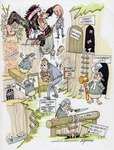T’was the night before layoffs, and all through the firm… October 14, 2009
Posted by admin in : Uncategorized , trackback All of us at the firm saw the writing on the wall by the time February rolled around. Despite language any reasonable person would have interpreted as a “no-layoff” promise, coupled with discussions about how securely leveraged the firm was, it was still clear to all of us at the ground level that things were not going well. Whispers of impromptu partner meetings buzzed around the firm halls, cliques of young associates gathered together in offices to discuss the latest ATL gossip, chatter of suspiciously high rates of “counseled out” associates (i.e. stealth layoffs) spread like wildfire on the firm’s messaging system. It was the worst of times, and we all knew it.
All of us at the firm saw the writing on the wall by the time February rolled around. Despite language any reasonable person would have interpreted as a “no-layoff” promise, coupled with discussions about how securely leveraged the firm was, it was still clear to all of us at the ground level that things were not going well. Whispers of impromptu partner meetings buzzed around the firm halls, cliques of young associates gathered together in offices to discuss the latest ATL gossip, chatter of suspiciously high rates of “counseled out” associates (i.e. stealth layoffs) spread like wildfire on the firm’s messaging system. It was the worst of times, and we all knew it.
When I was a summer associate, regular conversation fodder for our unnecessarily grandiose lunch and dinner hobnobbing events would be tales of the “hazing” that would ensue shortly after our firm life started. We heard stories of associates setting up cots in office corners, and of keeping pillows nearby to sneak a quick under-the-desk nap if an all-nighter had to be pulled. When it comes to”Big Law” clients do not wait, and why should they, they were paying “Big Bucks” for a reason. One summer associate dared to ask a partner point-blank about “work-life balance” at the firm. He said “honestly, how do you do it… do you find it hard to juggle a family, and life at the firm, because looking in it doesn’t seem easy to me.” The poor fellow did not get an offer (he was likely better off).
We all knew the firm was paying to own us, and we were for the most part, ok with that, it was the deal we were signing up for. At least for a few years until we were able to pay our debts and gain some valuable experience along the way. Enough experience to escape the grind, and go in-house or to a boutique with better hours. This very thinking is what firms count on and what forms the basis of Big Law economics. The attrition rate is the name of the game; it is the key statistic that all firms have to manage around. How much grain will fall through the cracks this year?
 The higher the number of older seasoned associates who decide their time is up the more new Ivy League clay needs to be imported for firm molding. During times of firm success the attrition rate typically hovers around 50% at large firms for third to fifth year associates, these rates are even higher as seniority levels closer to partner are approached. Except during times of economic woe, or near woe, the attrition rate, not unsurprisingly, begins to approach zero. This attrition rate phenomenon, compounded with less new legal business being initiated by the partners in general, along with the fact that many of the firm’s regular steady clients just no longer existed, along with a completely misguided plan of aggressive firm growth, hatched somewhere around 2004-2005, that resulted in unnecessarily doubling and tripling of recruitment efforts each subsequent year, was a surefire recipe for massive layoffs (yes I realize that was a mouthful, and a run-on sentence, but that is just the best way to put it).
The higher the number of older seasoned associates who decide their time is up the more new Ivy League clay needs to be imported for firm molding. During times of firm success the attrition rate typically hovers around 50% at large firms for third to fifth year associates, these rates are even higher as seniority levels closer to partner are approached. Except during times of economic woe, or near woe, the attrition rate, not unsurprisingly, begins to approach zero. This attrition rate phenomenon, compounded with less new legal business being initiated by the partners in general, along with the fact that many of the firm’s regular steady clients just no longer existed, along with a completely misguided plan of aggressive firm growth, hatched somewhere around 2004-2005, that resulted in unnecessarily doubling and tripling of recruitment efforts each subsequent year, was a surefire recipe for massive layoffs (yes I realize that was a mouthful, and a run-on sentence, but that is just the best way to put it).
Let me give you a peek now at what it was like going to work in the underbelly of the sinking RSS ELF every day for four months. There were two orientation dates for our class of 60. Approximately, half started in September and half in October. Those who started first had a slight advantage over the rest of us, they had an extra month to entrench themselves into the firm’s politics and to position themselves to receive billable projects with less competition, then those joining in October would face.
 The firm staffed cases through a central system, no one was supposed to go around the system (but everyone tried with little repercussion). Because there was so little work, projects that would come in would be assigned in a game show fast-buzzer style fashion. Those who read the e-mails quickest, were available at the time and had the fastest typing fingers secured the most work. An e-mail would go out from the central system “I need two attorneys to work on drafting a consumer credit agreement,” three seconds later… “thank you filled.” If you were on the phone, talking to your secretary, reading a case file, and for some reason didn’t see the e-mail the second it came in… consider yourself screwed. Relying on this system to get your work was guaranteed suicide and we all knew this. So instead most newer associates, while of course brushing up on their Mavis Beacon skills, sought other ways to keep busy.
The firm staffed cases through a central system, no one was supposed to go around the system (but everyone tried with little repercussion). Because there was so little work, projects that would come in would be assigned in a game show fast-buzzer style fashion. Those who read the e-mails quickest, were available at the time and had the fastest typing fingers secured the most work. An e-mail would go out from the central system “I need two attorneys to work on drafting a consumer credit agreement,” three seconds later… “thank you filled.” If you were on the phone, talking to your secretary, reading a case file, and for some reason didn’t see the e-mail the second it came in… consider yourself screwed. Relying on this system to get your work was guaranteed suicide and we all knew this. So instead most newer associates, while of course brushing up on their Mavis Beacon skills, sought other ways to keep busy.
The most popular option was to exploit a feature of the firm’s billing practices (devised in normal times) a feature that allowed for unlimited billable credit for pro bono work . The first years all knew this did not contribute to the firm’s profits, but it did contribute to our monthly hour totals. So each young associated loaded up on as much pro bono work as possible.
Sitting at lunch, we would often go around the table getting a recap of what everyone was working on. And the stories each week would be the same, “what are you working on” “nothing really, but whatever hours I am billing are all to the holocaust reparations program” or the “veterans appeals program” or the “immigration visa program” or the “crimstock program” or the “violence against women program.” We were all content with being busy with pro bono for a couple of reasons, 1) at least we were doing something, 2) it counted towards our required hours, 3) it felt good to help others and get paid Big Firm rates to do it, and 4) who knows, we were told if you do good work on a pro bono matter and network with the right senior associates and partners it could possibly lead to real billable work (hence going around the central system).
Despite our general desire to keep productive, all of us on the inside knew the played-up air of business was nothing but a Potemkin Village. But I fell victim to the pro bono fallacy as well; the consensus was as long as you’re doing pro-bono work you’re billing hours and you should be safe, because it would help keep you on track. This was a bizarre falsehood that no one really believed in the deeper they drilled down on it. Obviously no money was being brought into the firm from these endeavors, in fact– the firm often actually laid out all expenses for indigent clients. But it allowed a young associate to say “I did work today” when no actual billable work was in sight.
The ironic thing was although I kept a healthy stash of pro bono assignments at all times, as hard as I tried I couldn’t get as much as I wanted. I was e-mailing and calling public interest folks all around New York, offering to give my services away free of charge! Every other young associate at the firm had the same idea, and I’d venture to guess that many others at similarly situated Big Law firms did too. Needless to say in the world of Big Law pro bono work as insane as it sounds, supply exceeded demand. Of course all the internal pro bono was staffed immediately and there was not enough to keep 400+ lawyers busy for 8-10 hours a day. The only matters I could get my hands on from “firm approved” outside agencies were will drafting assignments, and when I brought this to the firm’s pro bono committee my request was denied because we didn’t have sufficient partners with expertise to supervise trust and estate matters. A second project, helping an educational company get goods back from their seized warehouse, was similarly denied because of the remote chance that a bank could have had a security interest in the goods and that bank could have at one time been a client of the firm (despite the case clearing conflicts). At one point I even tried to bring in my high school alma matter to incorporate a 501(c)(3) alumni club they had planned to start, which never panned out either.
My officemate, a Dartmouth Undergrad and Harvard Law School Alum (who was also negatively affected by the firm) had this to say about me when recommending me for a position with the federal government after the layoffs occurred:
“when the economy produced scarce billable work, some attorneys were content to wait at their desks until a new project was given to them; [Joblesslawyer] tirelessly sought out pro bono and practice development opportunities, both within and outside the firm.”
Looking back… a lot of good that did me.
 Aside from pro-bono, the first year’s attended more CLE classes then most attorneys attend throughout an entire career. If there was an open program being offered it was attended by the first-years. From an hours perspective this was worse than pro-bono time because this was included in our time sheets as “non-billable attorney development.” But choosing between CLE credits or sitting in one’s office watching old episodes of Arrested Development on Hulu (yes this was done regularly by the 95% of associates that had vacant time), the former would usually win out. I left the firm with enough CLE credits for the entire year plus all allowable credits that could be applied to next year. If extras could be transfered to other attorneys, I could likely stay afloat financially just selling my unused but accrued CLE credits from all the firm events I attended. I have enough print outs of power-point slides to wallpaper the Russian Tea Room twice over. So much for showing how eager to learn I was. Although I don’t regret not watching Hulu more, because I now have all the time in the world for that.
Aside from pro-bono, the first year’s attended more CLE classes then most attorneys attend throughout an entire career. If there was an open program being offered it was attended by the first-years. From an hours perspective this was worse than pro-bono time because this was included in our time sheets as “non-billable attorney development.” But choosing between CLE credits or sitting in one’s office watching old episodes of Arrested Development on Hulu (yes this was done regularly by the 95% of associates that had vacant time), the former would usually win out. I left the firm with enough CLE credits for the entire year plus all allowable credits that could be applied to next year. If extras could be transfered to other attorneys, I could likely stay afloat financially just selling my unused but accrued CLE credits from all the firm events I attended. I have enough print outs of power-point slides to wallpaper the Russian Tea Room twice over. So much for showing how eager to learn I was. Although I don’t regret not watching Hulu more, because I now have all the time in the world for that.
 The sixty or so first years, no doubt, spent more time organizing a mandatory holiday sing-a-long the two weeks leading up to Christmas than any client billable work up until that point. Those from my class know this is no exaggeration. The holiday party was treated for our purposes as the largest and most important firm client we had ever seen (we hadn’t seen many, but that’s besides the point). We had to take popular holiday songs, change their words to witty legal themed lyrics, practice them and perform them in front of the partners. One choice line was:
The sixty or so first years, no doubt, spent more time organizing a mandatory holiday sing-a-long the two weeks leading up to Christmas than any client billable work up until that point. Those from my class know this is no exaggeration. The holiday party was treated for our purposes as the largest and most important firm client we had ever seen (we hadn’t seen many, but that’s besides the point). We had to take popular holiday songs, change their words to witty legal themed lyrics, practice them and perform them in front of the partners. One choice line was:
“I’m dreaming of a small jail cell… just like the one Bernie Madoff used to know.”
If this would have kept me my job I would have sung all day long, now it just seems embarrassing to even have spent so much time and effort on this. I now imagine the partners snickering to themselves saying “you see the small guy with the Santa hat… he’s a goner” and yes … the Santa hats were mandatory. Despite all the effort opening night was worse than a third grade recital, perhaps our performance played a role in the layoff calculus, since this was some of the most substantial work we engaged in at the firm.
The big picture for us was bleak, and as we were learning this together as a class. We came to hate the arbitrary staffing system because there was nothing we could do to assure work. Further, those getting work were getting it mostly from secret networks, that did not conform to firm protocol and were not available to the rest of us. Typical white shoe cronyism I guess, no surprises there.
This was why when I was staffed on a huge anti-trust case I felt as if I had won the lottery. I worked my butt off on this case. I put in twelve hour days working straight through weekends, and left the office regularly at 4am. Everyone on the project was working these hours, but the strangest thing was we were all ecstatic to do so. “Thank you sir may I have another” was our mantra. To us it was a glimmer of hope, a glimmer of a chance to avoid what we came to see as the inevitable.
Finally though, I was experiencing a little of what I had expected to be experiencing from day one. Things were looking up at least for those of us assigned on this incredible monster document review. If the firm was going to do layoffs they weren’t going to touch the busy people right? Document review rooms were “safe zones”, we came to say. At several points during the review I was even asked by my supervisors to change the “briefing book” to account for some inconsistencies in the documents I spotted during the review process. So naturally that made me more valuable to the firm, right?
 Because we all felt lucky to have real work, the document review rooms were a bit more jovial in nature than the rest of the office (where morale was quite low). But there were still many who felt that the document review meant nothing as far as a firm commitment to job security. It turns out in hindsight, they were right. The older associates who knew they had no chance of making their hours, and had more work product to evaluate thought they were the prime targets for layoffs. Ominously they stated “first years are safe.” They would “never target the first years.” The document review room we were in became a group comedy room during breaks, where we would relieve our impending layoff anxiety by joking about them. We went around the table trying to name the best flavors of Ben and Jerry’s we could come up with for a new rescission ready ice cream line: “Pink Slip Peach,” “Strawberry Severance,” “Counseled Out Cobbler,” “Big Boot Blackberry,”… we had many more but I will leave it at that for now. We certainly did have a good laugh, unfortunately the firm had the last laugh.
Because we all felt lucky to have real work, the document review rooms were a bit more jovial in nature than the rest of the office (where morale was quite low). But there were still many who felt that the document review meant nothing as far as a firm commitment to job security. It turns out in hindsight, they were right. The older associates who knew they had no chance of making their hours, and had more work product to evaluate thought they were the prime targets for layoffs. Ominously they stated “first years are safe.” They would “never target the first years.” The document review room we were in became a group comedy room during breaks, where we would relieve our impending layoff anxiety by joking about them. We went around the table trying to name the best flavors of Ben and Jerry’s we could come up with for a new rescission ready ice cream line: “Pink Slip Peach,” “Strawberry Severance,” “Counseled Out Cobbler,” “Big Boot Blackberry,”… we had many more but I will leave it at that for now. We certainly did have a good laugh, unfortunately the firm had the last laugh.
 We discussed at one point if a person could be fired if they could not be located? We thought of ways to either hide ourselves at the office or in the alternative, to wear creative disguises. I suggested wearing those thick black-rimmed glasses with the built in mustache and plastic nose. How could a partner look at you in the face and fire you when your wearing that?
We discussed at one point if a person could be fired if they could not be located? We thought of ways to either hide ourselves at the office or in the alternative, to wear creative disguises. I suggested wearing those thick black-rimmed glasses with the built in mustache and plastic nose. How could a partner look at you in the face and fire you when your wearing that?
The document review conveniently ended on a Wednesday two days before the layoffs were announced. I forgot my Groucho glasses that day, but something tells me they wouldn’t have mattered.
When I was let go, I asked how the firm decided which 35 of the 60 of us first years they were laying off. He responded it was a “coin flip” it was “not merit based in any way” he said. He said it was partially a matter of what projects you were staffed on (which were out of our control) and what role we played on them, at the time when the layoff decisions were made. I asked the partner if it had anything to do with my horrible golf game that he had to witness at the firm retreat, he assured me it didn’t (although I have serious doubts about that, I was God awful- at one point I tore up a divot bigger than the partner’s head, with his own club and at his country club).
Some of the associates that were kept made sense, there were the associates with Russian language skills, the associates that had been investment bankers in a previous life, those with advanced technical degrees for the IP department and of course a partner’s son. But some of the keeps didn’t make sense, and many of the layoffs didn’t either. I walked out that day with someone with a degree from just about every top law school in the country. As far as the people on my floor alone that were asked to go, one girl was from Columbia, one from NYU, one from Northwestern, one guy from Cornell and my officemate was from Harvard– and that is just one floor. I’m not suggesting these degrees entitle them to something that others who didn’t attend these school are not entitled to. Not at all (I know plenty of great lawyers from all types of schools). I’m simply using it to illustrate the level of legal talent and skill that left the firm that fateful day.
 I was told I was being let go on a Friday, and that I had to have my office cleared and my matters wrapped up by the following Monday (i.e. within 3 days). This was a better arrangement than the staff got, who had to vacate the building the day of the layoffs and were not permitted back in, they had to have any personal items that belonged to them mailed, but not by much. When I arrived to work Monday I was not allowed to enter my own office to pack up. I had to be greeted in the lobby by someone from HR who would watch me pack up my personal effects and then escort me out of the building, just to make sure I wasn’t going to take a firm mouse pad, or possibly one of those vacuum packed granola bars they kept in the emergency kits and made such a big deal about replacing.
I was told I was being let go on a Friday, and that I had to have my office cleared and my matters wrapped up by the following Monday (i.e. within 3 days). This was a better arrangement than the staff got, who had to vacate the building the day of the layoffs and were not permitted back in, they had to have any personal items that belonged to them mailed, but not by much. When I arrived to work Monday I was not allowed to enter my own office to pack up. I had to be greeted in the lobby by someone from HR who would watch me pack up my personal effects and then escort me out of the building, just to make sure I wasn’t going to take a firm mouse pad, or possibly one of those vacuum packed granola bars they kept in the emergency kits and made such a big deal about replacing.
As I said earlier in the post it was no surprise that the firm was taking cost cutting measures. I just couldn’t understand the ruthlessness of their approach, especially after all the reassuring language we were indoctrinated with at firm events, retreats, and meetings. They went through such great lengths and expense to get us to where we were, and then they were willing to forget about those efforts in a blink of an eye. Attorneys who experienced “merit” based “counsel outs” were treated better. “Counsel Outs” are when attorneys are asked to leave the firm based on poor performance reviews, they are typically given three months to remain associated with the firm before ties are officially cut. During this time they can use the firm resources and say they are still employed by the firm. It allows this group to avoid the “damaged goods” stigma of a layoff! Yet those laid off the day I did got treated with less respect. (I do realize “Counsel Outs” can be used to dishonestly force people out, who during good economic times would never be asked to leave, I’m just using the process for comparison’s sake).
Other firms went through great lengths to offer public interest internships, pro bono fellowships, or other opportunities offering their attorneys half salary but the opportunity to have their employment re-evaluated at the end of the year. At least this shows some effort on the part of the firm to make good on their commitment. I suggested this approach in an e-mail to the managing partner of the New York Office, but he just said “we are keeping all options open” or something similarly vague. Just a month prior to D-day the managing partners had meetings with each class explaining that “layoffs” were a last resort and that the firm would do anything they could to avoid them– only this was not true. The firm cared more about being a “market leader” in severance pay than the future of their discarded, once heavily courted, ex-brethren.
 Facing a job market where shockingly, beyond any reason or logic, gaps in a resume or the word “layoff” still welcomes a response worthy of Hester Prynne’s emblazoned “A,” those three months of staying connected with the firm, or similarly a re-evaluation program could have made all the difference for us. C’est la vie.
Facing a job market where shockingly, beyond any reason or logic, gaps in a resume or the word “layoff” still welcomes a response worthy of Hester Prynne’s emblazoned “A,” those three months of staying connected with the firm, or similarly a re-evaluation program could have made all the difference for us. C’est la vie.
-
http://fillmydays.blogspot.com/ Little Lawyer
-
Name
-
2L
-
Name
-
Reality
-
middlelawlawyer
-
Keith
-
biglawsurvivor
-
John Wongy
-
Name
-
Name
-
formerlathamite
-
Name
-
Name
-
http://www.ronaldwfox.com/ Ron Fox
-
Bob
-
middlelawlawyer
-
Name
-
Lathamization
-
Name
-
Name
-
Name
-
PDzorro
-
Name
-
PDzorro
-
Name
-
Name
-
Name
-
Name
-
Name
-
Guest
-
moralpopo




